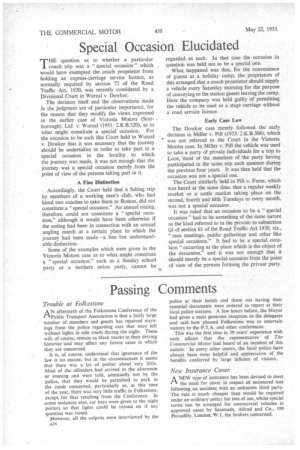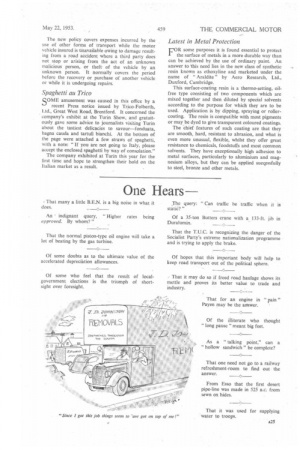Passing Comments
Page 26

Page 27

If you've noticed an error in this article please click here to report it so we can fix it.
Trouble at Folkestone
AN aftermath of the Folkestone Conference of the Public Transport Association is that a fairly large number of members and guests has received warnings from the police regarding cars that were left without lights in side roads during the night. These will, of course, remain as black marks in their driving histories and may affect any future cases in which they are concerned.
It is, of course, understood that ignorance of the law is no excuse, but in the circumstances it seems that there was a lot of pother about very little. Most of the offenders had arrived in the afternoon or evening and were told, admittedly not by the police, that they would be permitted to park in the roads concerned, particularly as, at this time of the year, there was very little traffic in Folkestone, except for that resulting from the Conference. In some instances also, car keys were given to the night porters so that lights could be turned on if any question was raised.
However, all the culprits were interviewed by the police at their hotels and those not having their essential documents were ordered to report at their local police stations. A few hours before, the Mayor had given a most generous reception to the delegates and said how pleased Folkestone was to entertain visitors to the P.T.A. and other conferences.
This was the first time in 30 years' experience with such affairs that the representative ' of The Commercial Motor had heard of an incident of this nature. In every other centre, the local police have always been most helpful and appreciative of the benefits conferred by large influxes of visitors.
New Insurance Cover
ANEW type of insurance has been devised to meet the need for cover in respect of uninsured loss following an accident with an unknown third party. The rate is much cheaper than would be required under an ordinary policy for loss of use, whilst special terms can be arranged for commercial vehicles in approved cases by Sasserath, Alfred and Co., 199 Piccadilly, London, W.1, the brokers concerned. The new policy covers expenses incurred by the use of other forms of transport while the motor vehicle insured is unavailable owing to damage resulting from a road accident where a third party does not stop or arising from the act of an unknown malicious person, or theft of the vehicle by an unknown person. It normally covers the period before the recovery or purchase of another vehicle or while it is undergoing repairs.
Spaghetti au Trico
qcnviE amusement was caused in this office by a recent Press notice issued by Trico-Folberth, Ltd., Great West Road, Brentford. It concerned the company's exhibit at the Turin Show, and gratuitously gave some advice to journalists visiting Turin about the tastiest delicacies to savour—fonduata, bagna cauda and tartufi bianchi. At the bottom of the page were attached a few straws of spaghetti, with a note: "If you are not going to Italy, please accept the enclosed spaghetti by way of consolation."
The company exhibited at Turin this year for the first time and hope to strengthen their hold on the Italian market as a result.
Latest in Metal Protection
FOR some purposes it is found essential to protect the surface of metals in a more durable way than can be achieved by the use of ordinary paint. An answer to 'this need lies in the new class of synthetic resin known as cthoxyline and marketed under the name of " Araldite " by Aero Research, Ltd., Duxford, Cambridge.
This surface-coating resin is a thermo-setting, oilfree type consisting of two components which are mixed together and then diluted by special solvents according to the purpose for which they are to be used. Application is by dipping, spraying or rollercoating. The resin is compatible with most pigments or may be dyed to give transparent coloured coatings.
The chief features of such coating are that they are smooth, hard, resistant to abrasion, and what is even more unusual, flexible, whilst they offer great resistance to chemicals, foodstuffs and most common solvents. They have exceptionally high adhesion to metal surfaces, particularly to aluminium and magnesium alloys, but they can be applied successfully to steel, bronze and other metals.




















































































